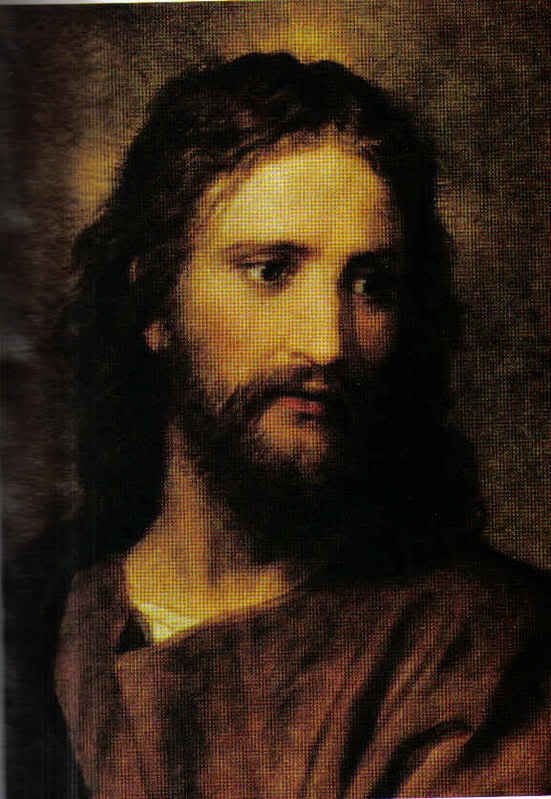
We have the Lord's perspective on the panorama of Church history, as churches of various traditional back grounds, and even of those that continue and coexist today.
The Lord addressed seven churches located in Asia Minor when He appeared to the apostle John while he was exiled on the island of Patmos (Rev 1:9-11). These churches, in the order they're addressed, are in clock-wise direction, forming a kind of oval shape on a map. This lends to the historical view of these churches as representing various church-eras, as well as surviving denominations that have deep traditional roots.
Let us see that of the seven, only the final four churches, while representing their own historical era, are with us today. This is seen in the fact that these four each are spoken of in the context of Christ's second coming (Rev 2:18, 22; 3:1, 3; v.v.7, 10; v.v. 14, 20).
This presentation is not meant to be a treatise against denominations, nor against denominationalism as such. But simply to see where each church is today in light of what Jesus said concerning them. Nor yet is this meant to exalt one denomination, or group of people over another. But honest readers of church history can assess for themselves where their church or denomination is in relation to Christ Who stands in the midst of the seven golden candlesticks.
The Seven Church types through the ages, with brief commentary (the years are mere approximations and not intended to be exact):
1. Ephesus (2:1-7): The Patristic Era (35-120 A.D.);
2. Smyrna (2:8-11): The Apologetic Era (120-220 A.D.);
3. Pergamos (2:12-17): The Philosophic Era (220-305 A.D.);
4. Thyatira (2:18-29): The Catholic Era (305-1499 A.D.);
5. Sardis (3:1-6): The Protestant Era (1500-1906 A.D.);
6. Philadelphia (3:7-13): The Pentecostal Era (1906-? A.D.);
7. Laodicea (3:14-22): The Charismatic/Evangelical Era (1970-? A.D.):
1. Ephesus- The Patristic Era:This time span of the Church extends from the time approximately when Christ ascended into heaven (Acts 1:9) down until about the time of Irenaeus (2nd century A.D.).Based on the Scriptures for this time period, the church already left her first Love (2:4b ). She was more or less alright in terms of form and works. Around this time the Didache was written, which is also called the Commandments of the 12 Apostles. And in Didache XI, we have evidence that during this time itinerant apostles (other than, or in addition to the 12) and prophets were roaming about the known world preaching, and ministering the Gospel.Yet during this time, formalism began to appear. Due to the threat of Gnosticism, and State sponsered persecution (Nero's persecution occured during this time) the Church identified itself as "catholic", meaning universal, to include all the communities of those who believed in the same Lord Jesus Christ come in the flesh. Ignatius, Bishop of Antioch (d.107 A.D.), who wrote seven epistles on his way to be martyred in Rome, emphasized in them the authority of the ecclesiastical heirarchy even to the point of comparing them to the Members of the Godhead. Which, truth be told, is the right of every believer to participate in the divine nature (2Pet 1:4). No where in Scripture is this comparison the sole designation of the "Clergy". In fact this was the beginnings of the "Clergy-Class" mentallity.2. Smyrna- The Apologetic Era:
This time of the Church was known for its heavy persecution. Fear none of those things which thou shalt suffer: behold, the devil shall cast some of you into prison, that ye may be tried; and ye shall have tribulation ten days; be thou faithful unto death, and I will give thee a crown of life.- 2:10. During this time several wrote apologetic treatises to either Roman emperors, or others influential in Roman society in order to explain their faith in the face of tremendous persecution and martyrdom in the Church. Interesting is that the tribulation Jesus mentions was to last "ten days", which it has been customarily understood that there were 10 major persecutions:
1) Persecution under Nero (64-68);
2) Persecution under Domitian (81-96);
3) Persecution under Trajan (112-117);
4) Persecution under Marcus Aurelius (161-180);
5) Persecution under Septimus Severus (202-210);
6) Persecution under Maximinus the Thracian (235-38);
7) Persecution under Decius (250-251);
8) Persecution under Valerian (257-259);
9) Persecution under Aurelian (270-275);
10) Severe Persecution under Diocletian and Galerius (303-324)*
* (Dates and names from Wikipedia).
Of course these dates overlap other "eras" of the Church, but primarily this era is the epicenter for persecution. But also the harsh tribulation that the Church endured during this time, and the apologetics that came out of Smyrna led to the following era-
3. Pergamos- The Philosophic Era:Due to the percieved need to compose apologetical works in defense of the gospel and Christian theology, there began to be a heavy leaning on human wisdom and philosophy. Justin Martyr (d.x) was one of the first to orient Christian thinking toward the classical Philosophers. In fact, he credits his conversion experience to an elderly Philosopher he met on a beach. One is left wondering who it was. I kind of surmise that it was one of the apostles, but I don't know.One of the biggest exponents of marrying apologetics to secular philosophy was Clement of Alexandra (d.211/216), followed by his disciple Origen (d.254).
But not all were in favor of such an approach. Tertullian was strongly anti-philosophy. His famous statement, "What does Athens have to do with Jerusalem?" makes this pretty clear. And yet, having been a jurist himself prior to his conversion, he didn't refrain for using his talents for the Lord in this area. But neither did he wed human philosophy with Christianity as did many his contemporaries.4. Thyatira- The Catholic Era:
This era comprises a great expanse of time, and is the first of the final four churches which still have expression today, and will see the Lord's return.
Thyatira spans at least from the conquest of Constantine until the beginnings of Protestantism. Thyatira includes both Eastern and Western forms of Catholicism (Roman Catholocism, Eastern Orthodox, including Russian, Oreintal, Coptic, et. al.), as well as non-Protestant Anglicanism.There are severe issues going on in the Thyatira church which the Lord adresses. These include idolatry and sexual immorality (2:20-22). The idolatry is obviously refer to the images and icons which Roman and Eastern Orthodox Churches have long engaged in. And of course the reference to sexual immorality (fornication, and adultery) is often spiritual in Scripture as idolatry.( Ex 34:15; Ezek 16:36).
Yet Jesus says, I know thy works this being said in a positive way. And the Catholic Church, particularly the Roman branch, has been a leader in works of charity, as is exemplified by Mother Teresa's order the Sisters of Charity, which she founded in Calcutta, India amongst some of the poorest folk in the world.
5. Sardis- The Protestant Era:
This period began in 1517 when Martin Luther nailed his " Ninety-Five Theses on the Power of Indulgences" to the door of the Wittenberg Castle Church, which was like a bulletin board for university related announcements. Though Luther's forerunners were such men like John Wycliffe, and John Huss.
6. Philadelphia- The Pentecostal Era:
In Topeka, Kansas Charles Parham lead a group of Christian seekers of the baptims in the Holy Ghost, as evidenced by speaking in other tongues. They were met by God in a powerful out pouring of His Spirit. Thus the Pentecostal revival began. The fires of Pentecost soon spread all over the world launched from a small church in Los Angeles, located on Azuza Street. The pastor's name was William Seymore. He had met Charles Parham at a conference in Dallas, Texas. But the Pentecostal revival began to be known as the Azuza street revival. From this place it spread as a world-wide phenomena.
7. Laodicea- The Charismatic/Evangelical Era:
By the 1970's, there began to be a secularization of the Charismatic movement where there was a distancing from Pentecostalism doctrinally. This distancing has been covered my post "Confusing the Gift with His Gifts".
The results have been a "safe" approach to the supernatural in the Church, and a more "marketable" gospel that appeals to the "worldly" Christian who expresses his worship on Sundays only, and has no depth to his spirituality. This "room temperature" Christianity is what Christ referred to as lukewarmness (Rev 3:16).
*This blog post requires further research, and is a work in progress. More will be added soon before I call this post "done".







